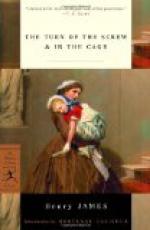CHAPTER V
This was neither more nor less than the queer extension of her experience, the double life that, in the cage, she grew at last to lead. As the weeks went on there she lived more and more into the world of whiffs and glimpses, she found her divinations work faster and stretch further. It was a prodigious view as the pressure heightened, a panorama fed with facts and figures, flushed with a torrent of colour and accompanied with wondrous world-music. What it mainly came to at this period was a picture of how London could amuse itself; and that, with the running commentary of a witness so exclusively a witness, turned for the most part to a hardening of the heart. The nose of this observer was brushed by the bouquet, yet she could never really pluck even a daisy. What could still remain fresh in her daily grind was the immense disparity, the difference and contrast, from class to class, of every instant and every motion. There were times when all the wires in the country seemed to start from the little hole-and-corner where she plied for a livelihood, and where, in the shuffle of feet, the flutter of “forms,” the straying of stamps and the ring of change over the counter, the people she had fallen into the habit of remembering and fitting together with others, and of having her theories and interpretations of, kept up before her their long procession and rotation. What twisted the knife in her vitals was the way the profligate rich scattered about them, in extravagant chatter over their extravagant pleasures and sins, an amount of money that would have held the stricken household of her frightened childhood, her poor pinched mother and tormented father and lost brother and starved sister, together for a lifetime. During her first weeks she had often gasped at the sums people were willing to pay for the stuff they transmitted—the “much love"s, the “awful” regrets, the compliments and wonderments and vain vague gestures that cost the price of a new pair of boots. She had had a way then of glancing at the people’s faces, but she had early learnt that if you became a telegraphist you soon ceased to be astonished. Her eye for types amounted nevertheless to genius, and there were those she liked and those she hated, her feeling for the latter of which grew to a positive possession, an instinct of observation and detection. There were the brazen women, as she called them, of the higher and the lower fashion, whose squanderings and graspings, whose struggles and secrets and love-affairs and lies, she tracked and stored up against them till she had at moments, in private, a triumphant vicious feeling of mastery and ease, a sense of carrying their silly guilty secrets in her pocket, her small retentive brain, and thereby knowing so much more about them than they suspected or would care to think. There were those she would have liked to betray, to trip up, to bring down with words altered and fatal; and all through a personal hostility provoked by the lightest signs, by their accidents of tone and manner, by the particular kind of relation she always happened instantly to feel.




